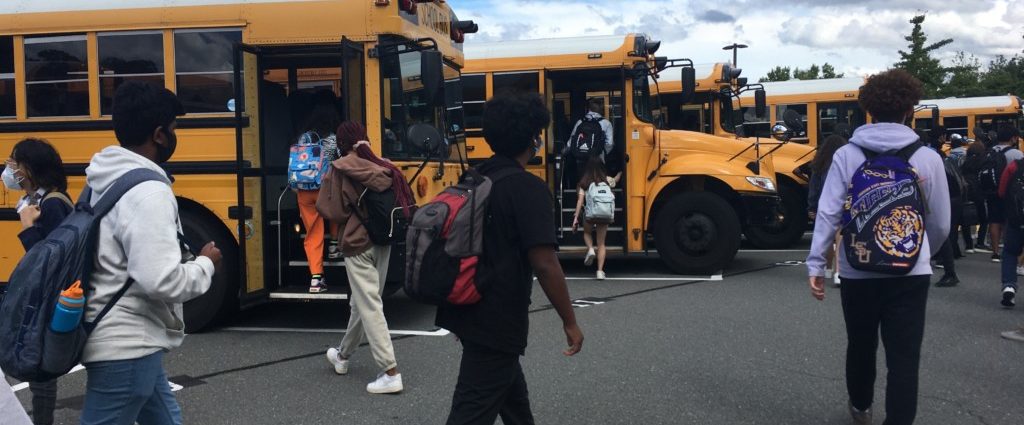A bus rolls up to Door 1 and students pile out. “Thank you!” “Have a good day!” they call, and wave to their driver. He smiles back – and then prepares to double back for a second run.
For bus driver Jamal Moujtahid, the return to school has meant extra shifts. Still, one of his favorite parts of the job continues to be these interactions with students, as well as the unique experiences it provides.
“I love to be around students, different cultures,” Moujtahid said. “I like to discover a new area around Fairfax County, [or the] DC area – I love field trips.”
Moujtahid said driving buses is fun, but he takes his job seriously.
“The most difficult thing is to stay focused all the time so I can take kids to school and back to their houses safely,” he said.
Junior Kylie Steinfadt, who takes Moujtahid’s bus, said she appreciates the drivers.
“[Moujtahid] always says good morning to me,” said Steinfadt. “He’s [also] good about rules and keeping everyone safe on the bus.”
Steinfadt said the buses usually arrive on time, too. However, there have been issues with delays recently, due to an extreme shortage of bus drivers in FCPS.
A section on the Marshall website explains the delays, saying the few active drivers often have to double back during their runs to pick up students from different routes.
This, along with other issues arising from similar shortages around the country, has left thousands of students potentially without transportation to schools, said ABC in August.
Additionally, the shortage has put a lot of pressure on bus drivers to complete pick-ups and drop-offs as quickly as possible.
“Before [the pandemic], we’d have enough time to use the bathroom, clean the bus, walk,” Moujtahid said. “[Now], I barely have time to use the bathroom between runs.”
Another student on Moujtahid’s bus, junior John Kronzer, said he sympathizes with the drivers during the shortage.
“Their pay went down,” Kronzer said. “And [Moujtahid] was still driving. I totally would have understood if he just quit.”
Pay decrease seems to be an idea repeated through the school, though Moujtahid said the rumor is not exactly correct.
“Actually, we didn’t get a raise for a couple years,” he said. “[The] salary didn’t go down, but it doesn’t go up enough.”
The pay for bus drivers has only recently increased, in response to the shortage, and FCPS has even added a $3,000 sign-on bonus for new drivers to incentivize application. However, these perks don’t necessarily apply to long-time employees.
Therefore, there is both a lack of willing new employers, and dissatisfaction in the senior ranks.
In addition, Moujtahid said many drivers have recently retired or quit because they couldn’t keep up with the split schedule bus driving demands, exacerbating the shortage.
“[There are] few [work] hours in the morning and few hours in the afternoon,” Moujtahid said.
“We only get paid for the hours we drive. Unless you have a shuttle or field trip, you’re always going to have that gap from 9:30 AM to 1:30 PM without pay.”
To fill this gap, Moujtahid said he has to work part time elsewhere.
“For 13 years I’ve been working seven days a week,” he said. “I don’t have a choice. I have a mortgage and expenses to pay, [and] driving for FCPS doesn’t cover all my monthly expenses.”
Moujtahid said he hopes students, and everyone, pays more attention to bus drivers in the future.
“Bus driving is the most difficult job out there,” he said. “We transport students, and we are responsible for their lives.”
It is appreciation for this vital job that the pandemic has prompted, whether in administration as they hang signs for new employees; or in students, standing at their bus stop and waiting to say hello.

